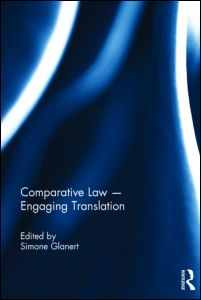Comparative Law – Engaging Translation

Edited by Simone Glanert
Routledge – 2014 – 224 pages
Hardback: £80.00
978-0-415-64270-5
26th June 2014
In an era marked by processes of economic, political and legal integration that are arguably unprecedented in their range and impact, the translation of law has assumed a significance which it would be hard to overstate. The following situations are typical. A French law school is teaching French law in the English language to foreign exchange students. Some US legal scholars are exploring the possibility of developing a generic or transnational constitutional law. German judges are referring to foreign law in a criminal case involving an honour killing committed in Germany with a view to ascertaining the relevance of religious prescriptions. European lawyers are actively working on the creation of a common private law to be translated into the 24 official languages of the European Union. Since 2004, the World Bank has been issuing reports ranking the attractiveness of different legal cultures for doing business. All these examples raise in one way or the other the matter of translation from a comparative legal perspective. However, in today’s globalised world where the need to communicate beyond borders arises constantly in different guises, many comparatists continue not to address the issue of translation. This edited collection of essays brings together leading scholars from various cultural and disciplinary backgrounds who draw on fields such as translation studies, linguistics, literary theory, history, philosophy or sociology with a view to promoting a heightened understanding of the complex translational implications pertaining to comparative law, understood both in its literal and metaphorical senses.
Contents
Notes on Contributors
Acknowledgements
Chapter 1 Translation Matters
Simone Glanert
PART I – ADDRESSING TRANSLATABILITY
Chapter 2 Translation as Ethics
Alexis Nouss
Chapter 3 Who’s in Control? Translation, Cost and the Origins of Speciation
Michael Cronin
Chapter 4 Legal Translation and the Problem of Heteroglossia
Kwai Hang Ng
Chapter 5 Catching the Spirit of the Law: From Translation to Co-Drafting
Jean-Claude Gémar
PART II – THE SPECIFICITY OF COMPARATIVE LAW
Chapter 6 Comparative Law and the (Im)Possibility of Legal Translation
Jennifer Hendry
Chapter 7 Legal Translation and the ‘Contamination’ of Comparative Legal Research
C.J.W. (Jaap) Baaij
Chapter 8 Translating Civil Law ‘Objectivity’ with an Adversarial Brain: An Ethnographic Perspective
Shawn Marie Boyne
Chapter 9 The Powerless Translator: An Argument From Legal ‘Culturemes’
Raluca Bercea
PART III – TRANSLATION BEYOND TRANSLATION
Chapter 10 Translating Religious Principles into German Law: Boundaries and Contradictions
Pascale Fournier and Régine Tremblay
Chapter 11 Of Friendless and Stained Men: Grafting Medieval Sanctions Onto Modern Democratic Law
Luca Follis
Chapter 12 Abuse of Tax Law as a Language of Morality in Modern Times: A Comparative Analysis of France, Canada and Ireland
Bénédicte Sage-Fuller and Ferdinand Prinz zur Lippe
Chapter 13 Withholding Translation
Pierre Legrand,
Index
http://www.routledge.com/books/details/9780415642705/